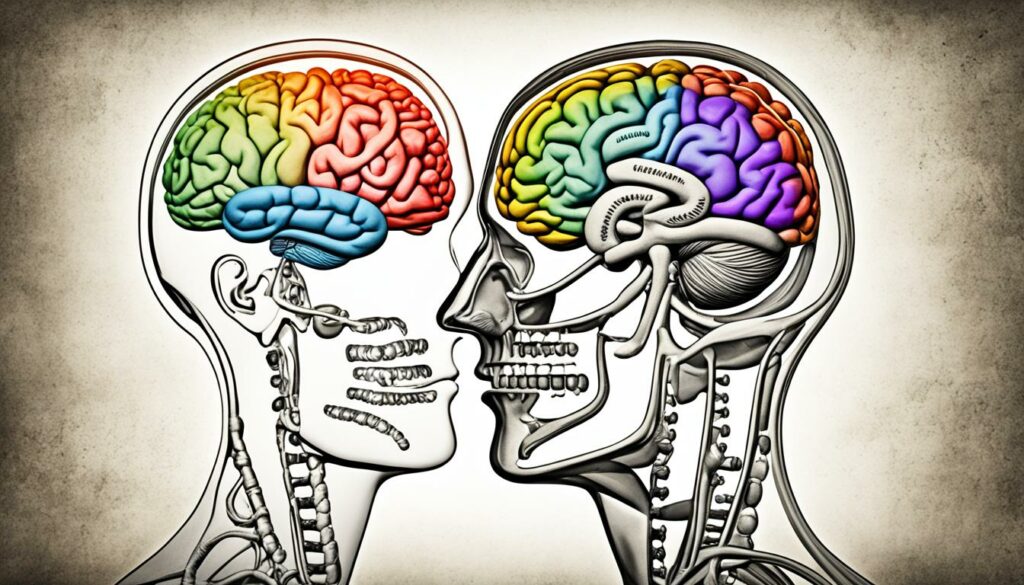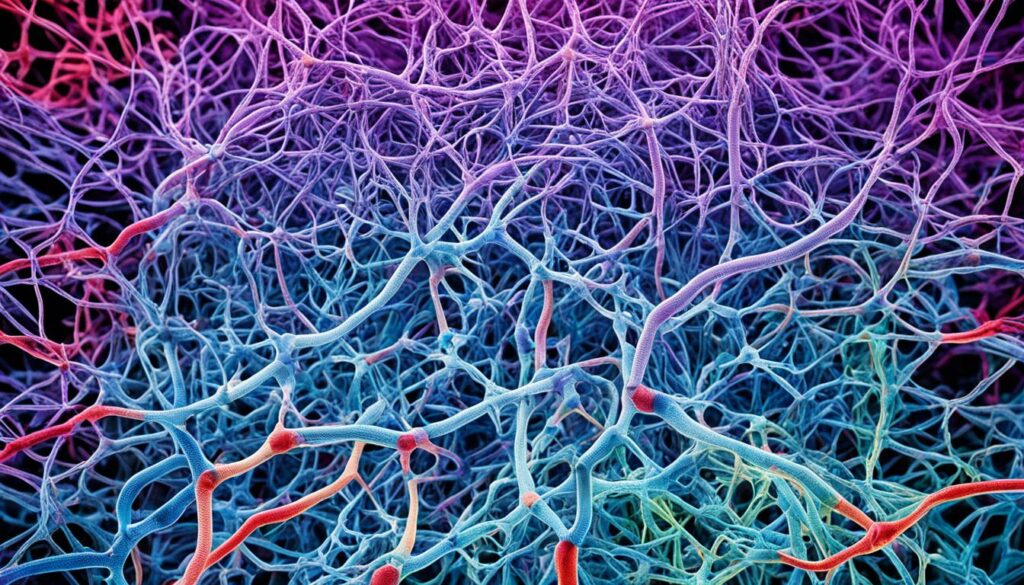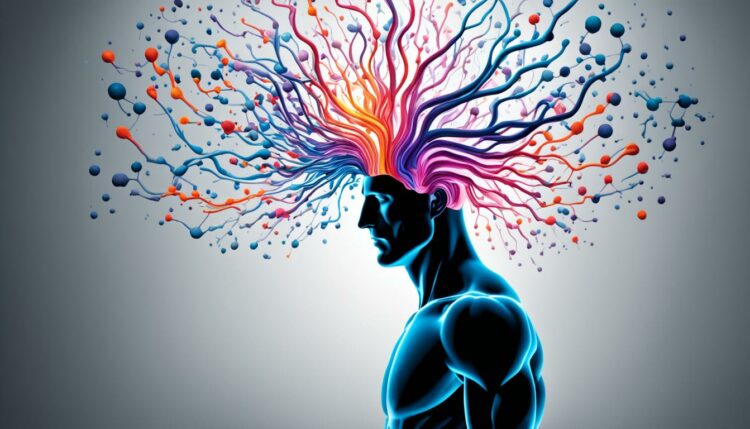In the complex world of hormones that control male sex drive, a hormone usually linked with breastfeeding in females, prolactin (PRL), plays a subtle but key role in a man’s sex drive. This relationship between prolactin and dopamine is critical. It shows how they manage sexual desire, affecting behavior beyond just creating offspring.
Though many think prolactin lowers sexual interest, studies with male mice reveal sudden prolactin changes don’t affect their sexual or recovery time after ejaculation1. Yet, in humans, higher prolactin often means lower sex drive and various sexual problems1.
This difference is fascinating and might lead to new discoveries in how male sex drive works. Understanding dopamine and prolactin’s roles could open doors to new treatments.
Key Takeaways
- Low baseline levels of prolactin demonstrate its nuanced role in male sex drive dynamics1.
- Prolactin’s expected contribution to post-ejaculatory refractory periods is not supported by acute manipulation studies in male mice1.
- Dopamine and prolactin have a complex interrelationship that affects sexual behavior and refractory periods1.
- High prolactin levels in humans are associated with decreased sexual desire and dysfunction, a significant departure from certain animal models1.
- Further research into dopamine and prolactin’s interaction could reveal new treatments for sexual health disorders.
The Role of Neurotransmitters in Male Libido
The search to understand human sexuality highlights the key role of neurotransmitters. These chemical messengers play a big part in male libido. Knowing how dopamine influences sexual desire helps us understand brain chemistry and sexual health better.
Understanding Dopamine Function in Sexual Desire
Our sexual desire is tied to our brain’s biology. Dopamine, known as the ‘pleasure chemical,’ is central to this. It helps in rewarding behaviors like eating and reproduction2.
Research has shown dopamine’s effect on male sexual activity, especially how it changes sexual patterns3. Sexual enjoyment is linked with activating dopaminergic neurons in our brains2.
Dopamine also affects men’s physical sexual arousal. It causes erections by making blood vessels in the penis widen2. Over time, we’ve learned a lot about dopamine receptors. We found that stimulating certain D-2 receptors affects sexual arousal3.
The Impact of Brain Chemistry on Sexual Health
Brain chemistry deeply influences sexual health. Our nervous system, including dopamine and serotonin paths, defines our sexual responses2. Both activation and inhibition of sexual activity are controlled by these neurotransmitters. Even in female rats, we see how a network of neurons affects sexuality3.
Moreover, being sexually active is good for mental and physical health2. This shows that sexual behavior is not just for pleasure. It reflects our overall health. Cultural and ethical norms also play a role2.
| Aspect of Sexual Health | Neurotransmitter Role | Benefit |
|---|---|---|
| Psychological Well-being | Reinforcement of positivity via dopaminergic neurons | Enhanced mood and self-esteem |
| Physiological Arousal | Sensory signal transduction and receptor activation | Appropriate physical response and sexual function |
| Cultural Influence | Modulation of desire aligned with societal norms | Psychosocial integration and adaptability |
Exploring male sexual response and drive shows the importance of dopamine. The balance of this chemical, along with others, forms the basis of sexual desire and its effects23. Understanding our brain’s role in sexual health offers valuable insights into human sexuality.
Exploring Prolactin Levels and Their Effects on Men’s Sexual Wellness

Understanding how prolactin levels affect men’s sexual wellness is key. Imbalances can lead to hyperprolactinemia. This condition impacts both body and mind. Studies show that keeping prolactin in check is crucial for a healthy male libido.
Hyperprolactinemia and Its Influence on Male Libido
Too much prolactin production can cause hyperprolactinemia. This often reduces sexual desire. It’s an important, lesser-known aspect of men’s sexual wellness.
Prolactin Regulation and Its Role in Mental Health
Regulating prolactin is also vital for mental health. High levels are linked to mood swings, depression, and anxiety. This highlights its wide-reaching impact on psychological health.
| Age Group | Sexual Activity | HIV Prevalence | HIV Incidence |
|---|---|---|---|
| 65-74 | 60% active sex life4 | 40% increase (2015-2019 USA)4 | 15% increase (2015-2019 USA)4 |
| 70-80 | Sex at least twice a month | N/A | N/A |
| 50+ | N/A | 5.4m to 8.1m globally (2015-2020)4 | 8% decrease USA4 |
Dopamine and Prolactin Interaction in Male Sexual Behavior
The dance between prolactin and dopamine in men is key for sexual behavior. Prolactin is released in pulses during activities like mating.
This shows a deep connection with dopamine’s rewarding sensation5. Moreover, prolactin also affects the brain by promoting new nerve growth. This could change behaviors and thoughts related to sex5.

The interaction between these hormones can vary. When balanced, prolactin helps with testosterone creation and sperm production, vital for a healthy sex life5. But, high prolactin can lower testosterone, which reduces male sex drive5.
These hormones’ roles go beyond human biology. Prolactin also helps in water balance in fish and producing crop milk in birds. It plays a big part in the reproductive behaviors of various animals5. Its broad impact might give clues to its evolutionary role in sexual health.
Dopamine and prolactin not just affect sex directly but also prep the body for mating. Versions of prolactin in humans ready the body for reproduction. They help grow mammary glands and ready milk production after pregnancy5.
These hormones lay the groundwork for understanding male sexual behavior. The balance between them is crucial for sexual health. When this balance is off, like with high prolactin, it can lessen sexual desire and ability. This underlines how important hormone regulation is for keeping a healthy sex life5.
The Influence of Hormone Regulation on Male Sex Drive
Hormones play a key role in a man’s sexual behavior. Testosterone, dopamine, and prolactin are especially important. They work together to control sexual desire. This involves a mix of rising and falling levels, affected by the body’s internal clock.
Understanding how these hormones interact helps us know why sex drive can change. It also shows the impact of hormone imbalances.
Dopamine and Prolactin Role in Sexual Motivation
Dopamine is known as the ‘feel-good’ hormone. It’s vital for sexual arousal and enjoying pleasant experiences. Prolactin, though usually linked to breastfeeding, also matters for men’s sexual health. Keeping prolactin levels in check is important.
Circadian Rhythms: Testosterone and Its Connection with Dopamine and Prolactin
Men’s testosterone levels go up and down during the day. This cycle affects dopamine and prolactin too. Together, they influence libido and sexual performance. High prolactin can reduce sexual desire and lead to problems like erectile dysfunction6.
Studies show that high prolactin activates certain brain areas related to arousal. This confirms its complex role in controlling sex drive6.
| Factor | Low Prolactin Impact | High Prolactin Impact |
|---|---|---|
| Sexual Function | Worsening | Erectile Dysfunction |
| Orgasm Enjoyment | Reduced | Not Directly Assessed |
| Overall Health | Higher BMI/Blood Glucose, Lower Physical Activity | Increased Activity in Brain Regions Related to Arousal |
| Animal Study Insights | Not Applicable | Boosted Sexual Behavior |
Hormonal balance is like a perfect musical ensemble. It’s crucial for a strong and stable male sex drive. By learning about hormone regulation, we can make better sexual health a reality.
Conclusion
We’ve looked closely at how neurotransmitters and hormones impact men’s sexual health. The key players here are dopamine and prolactin. Their balance is crucial for a healthy sex life.
In a study with five healthy men, each took 50 mg of chlorpromazine and 50 mg of thioridazine. These drugs increased prolactin levels in just two hours6. It shows how thioridazine blocks dopamine in the brain6.
The insights gathered show how important prolactin and dopamine are. They respond well to drug treatment. This affects both sexual behavior and mental health. Understanding how medicines change these balances is key. It helps us see how sexual desire and behavior are controlled by complex factors.
This article sheds light on how neurotransmitters and hormones drive men’s sexual health. This knowledge is vital for new research and improving treatments. By learning more, we can make better interventions to help people. This understanding is crucial for both sexual health and overall well-being.
FAQ
What is the role of dopamine and prolactin in male sex drive dynamics?
Dopamine and prolactin are key to male sexual desire. Dopamine sparks pleasure and motivation, leading to arousal. Meanwhile, prolactin manages sexual function and mental well-being. Changes in their levels can drastically affect a man’s sexual drive.
How do neurotransmitters impact male libido?
Neurotransmitters, especially dopamine, directly affect male libido. Dopamine turns on the brain’s reward center. It boosts the joy and drive needed for sexual arousal and activity. If these chemicals are off balance, a man’s sexual health can suffer.
What are the effects of prolactin levels on male sexual wellness?
High prolactin levels, or hyperprolactinemia, hurt male sexual wellness. Men might feel less desire, have erectile problems, and struggle to reach orgasm. Since prolactin also affects mental health, these issues can impact a man’s overall well-being.
How do dopamine and prolactin interact in male sexual behavior?
Dopamine and prolactin balance each other in male sexual actions. Dopamine increases arousal and desire. Prolactin, however, reduces sexual motivation. This balance is vital for healthy sexual performance. Yet, when their levels are uneven, it can reduce a man’s sex drive and performance.
What is the connection between hormone regulation and male sex drive?
Hormones like dopamine and prolactin are crucial for a man’s sex drive. Dopamine fuels sexual motivation, and prolactin handles sexual function and mental health. They follow the body’s clock, affecting sleep and wakefulness. Testosterone also plays a part, linking closely with both dopamine and prolactin in influencing male sexual behavior.
Source Links
- https://www.nature.com/articles/s42003-020-01570-4
- https://www.ncbi.nlm.nih.gov/pmc/articles/PMC6908863/
- https://www.ncbi.nlm.nih.gov/pmc/articles/PMC9312911/
- https://www.ncbi.nlm.nih.gov/pmc/articles/PMC10148255/
- https://en.wikipedia.org/wiki/Prolactin
- https://www.jamanetwork.com/journals/jamapsychiatry/fullarticle/491388
Note from Steve: The supplements and foods I mention below are part of my personal journey towards optimal health and vitality. My experiences are unique to my own body’s needs and responses. Please remember, what works for one individual may not work for everyone. Always consult with a healthcare professional before making any changes to your diet or supplement routine.




